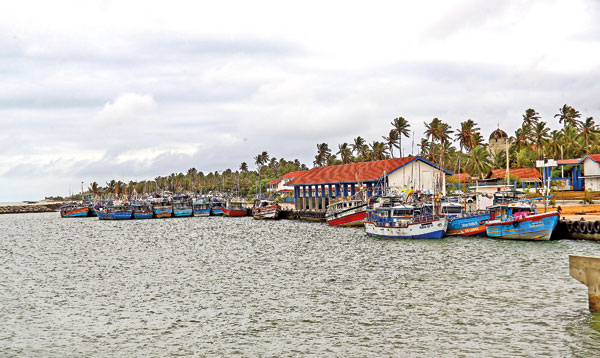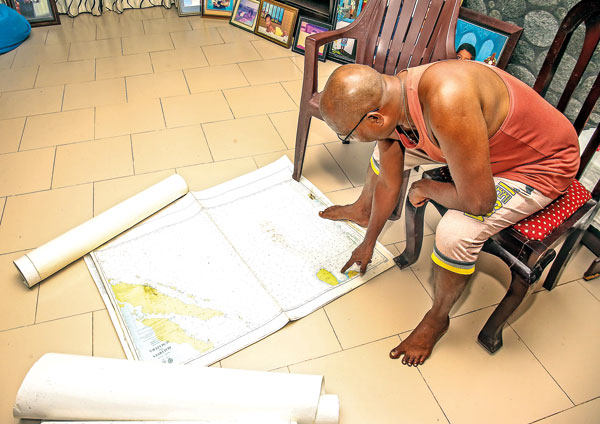News
‘This is the way I did it’
View(s):
76 people including five women and seven children, sailed from the Wellamankara harbour in Wennappuwa on the night of June 6 this year. The journey was short. They were caught the next day by a Sri Lanka Navy patrol boat
-
Namini Wijedasa talks to a kingpin who thrives in his people-smuggling business
Nishantha Fernando met us at the door of his two-storey mansion in Barudelpola.
“I knew you were coming,” he announced.
News travels fast in this pretty fishing village near Marawila. We were shown into his hall, with its giant widescreen television, patterned chairs and prominent altar to Jesus.
Mr Fernando quickly finished his lunch. He dashed around. He smoked a cigarette. He pulled up a chair. Then, puffing out his chest, he declared: “Mama thamai gema karey”. I did it.
We were two journalists and a photographer. As public confessions went, this was extraordinary. Over the next 90 minutes, Mr Fernando admitted to having illegally dispatched hundreds of Sri Lankans to Australia by boat. He narrated his exploits with relish.
The majority were comfortably settled there, he bragged. He took a video-call to a Melbourne-based former “happy client” to prove his point. And, after diving into the depths of his sprawling residence, Mr Fernando even brought out a large roll of well-thumbed nautical maps to illustrate every skipper’s preferred route to Christmas Island.
But twelve of his boatloads went between 2010 and 2013, before the Australian Government introduced an unyielding new programme called ‘Operation Sovereign Borders’ (OSB) to stem maritime arrivals of asylum-seekers. The official stance is that nobody today stands a chance of entering and living in the country through illegal means.
Australia has funnelled millions of dollars into Sri Lanka to reinforce that message. And asylum-seekers who make it to Christmas Island are flown promptly back. In August, the Australian Border Force for the first time repatriated 46 Sri Lankans to Colombo aboard its largest patrol ship.
Newly-elected Prime Minister Anthony Albanese has reiterated that those arriving by boat will not gain residency in Australia. OSB will remain in place, he affirmed: “People smugglers seek to trade in misery.”
But Mr Fernando sees himself as a charitable chap. He was doing desperate Sri Lankans a favour, he pressed. Jaded by the country’s worst-ever economic crisis, with fuel shortages crippling fisheries and living costs soaring, they wanted to get out. He was merely charting the course. And when they earn Australian dollars and remit them, the local economy will benefit.
It may violate the law, Mr Fernando avows: “But it is not against God.” And he gestures beneficently towards the statue of Jesus above his head.
After nearly a decade, Mr Fernando organised a trip this year. Information was disseminated in tiers, by word of mouth. This is the modus operandi in most smuggling operations. There were recruiters. Separately, neighbours told neighbours. Friends told friends.
Residents of Barudelpola, Thoduwawa, Iranawila, Marawila, Kudamaduwella and surrounding villages–and even in the country’s north and the hill country–learned of the planned excursion. Mr Fernando urged them to join, saying his son and some relatives would be on board. This was a confidence trick, it was later alleged. Trust-building was vital.
A maximum of Rs 700,000 (in cash) was collected from each aspirant. Some got discounts at Mr Fernando’s discretion, paying between Rs 300,000 and 350,000. “They were mostly those who helped me,” he explained.
More than 80 people signed up. The majority had pawned or sold jewellery, and vended vehicles including motorcycles, fishing gear and other household goods to raise funds. Anything that could be turned into cash was converted. Nobody that takes those boats is rich.
Some received a day’s notice when the fishing trawler Mr Fernando arranged was ready. Others were told just hours in advance. Seventy-six people, including five women and seven children, sailed from the Wellamankara harbour on the night of June 6 this year. The journey was short. They were caught the next day by a Sri Lanka Navy patrol boat. They hadn’t even left territorial waters.
There are commonalities in this tale with other people-smuggling operations. The profiles of aspirants and their reasons for attempting to leave are similar. They were sick of deteriorating living standards and seek better for their families, particularly children.

No regrets: Nishantha Fernando points to map to show destination of the new trip he is organising
There’s been an explosion in numbers. Since May 18 this year, there were 1,074 recorded arrests. Last year, there were 221. The Eastern, Western, Northern, Southern and North-Western Provinces count the largest numbers.
Those who’ve paid fees to smugglers only to be caught are now worse off because they are entangled in costly court proceedings in addition to having lost their capital. They cannot redeem their jewellery, are in debt to loan sharks and are unable to find jobs. They also feel “labelled”.
Some people are apprehended in lodges while awaiting departure. It is likely that smugglers refuse to reimburse them, pleading heavy preparation costs. Money once handed over is overwhelmingly not returned.

In August, the Australian Border Force for the first time repatriated 46 Sri Lankans to Colombo aboard its largest patrol ship
Victims are crippled by fear. They have violated the law and are afraid to make demands as the organisers, often well-connected, dangle complicated legislation over their heads. The kingpins (they are identifiable at village-level) largely remain unscathed while their clients face court.
Mr Fernando has a simple explanation for why he roams free: His name isn’t on the paperwork. The fishing trawler is registered to another man. “And people are so grateful for my services that they didn’t give me up to the authorities,” he says, sagely.
The victims, well-coached, did not state his name in police statements. They fear that if he is arrested, they will not recoup their dues. Or that he will not settle fines imposed on them by court. Even their cases are handled through a lawyer Mr Fernando has supplied.
The confiscated fishing trawler was released within days. When asked whether the local police were in his keep, Mr Fernando chuckled. “Ekaney mang weddek kiyanney,” he said. That’s why they call me a clever man.
That is not to say nobody goes to jail. Warnakulasuriya Nishantha Thamel, the 30-year-old skipper of a trawler named “Lisa Duwa” caught in Australian waters in May this year, is still in remand in Sri Lanka. He had taken his own vessel on a perilous 19-day journey along with 11 friends and relatives.
But that is a different type of operation. These are not put together by well-connected kingpins. They are devised by groups of frustrated friends and family who typically have an experienced ship’s captain amongst them. They pool monies and head out, encouraged by reports of “others doing well” in Australia. When busted, they don’t have the resources or the influence to pull strings. We also encountered one such case in Thoduwawa.
Authorities in Colombo revealed another recent trend. “In 2022, almost all of these smuggling operations are scams,” a senior security sector official said, on condition of anonymity. “The organisers tip off the authorities. This happens also to victims who are awaiting departure in lodges.”
It is suspected that Mr Fernando had done the same. He acknowledged the rumours in the village but vehemently denied them.
The authorities claim lawyers practised in handling these cases ensure that organisers, even when caught, are released relatively quickly to re-offend. “After they come back, they do the same thing,” the security official said.
The money pouring in from Australia will not have an impact if those on the ground are not educated, we were repeatedly told. Despite hundreds of repatriations, the message wasn’t filtering to the grassroots.
There is still strong belief–exploited and nurtured by the likes of Mr Fernando–that illegal asylum-seekers are welcomed with open arms by the Australian Government; that they were sympathetic to the difficulties of Sri Lankans.
Some fisher folk insist there are people who made it through. One woman referred to “the friend of neighbour who’d left on a boat with her family” and didn’t return. Another fisherman spoke of two boats that had set off from Iranawila. “I hear that the people on those boats are in Australia now,” he said.
The counter-narrative is weak and ineffectual. A few television advertisements aren’t doing the trick. It is not clear what the Sri Lankan Government is doing, beyond accepting Australian funds and stopping boats.
There is no intervention on behalf of victims who have lost their money and their livelihoods. If the laws require tightening, there is no move in that direction. A handful of criminals are earning from a practice that does not seem too difficult to eliminate.
Why firmer action isn’t taken against the likes of Mr Fernando is a mystery. He is known in some security circles as “Bottu Nishantha”. He has a different nickname in the village, where he’s notorious for more nefarious business.
As we were leaving, Mr Fernando told us he is organising another trip.
“I’m sending them to British this time,” he said, pointing at an island on one of his maps.
Turns out he meant Diego Garcia. And he seems protected enough to put his scheme to action.
The best way to say that you found the home of your dreams is by finding it on Hitad.lk. We have listings for apartments for sale or rent in Sri Lanka, no matter what locale you're looking for! Whether you live in Colombo, Galle, Kandy, Matara, Jaffna and more - we've got them all!

